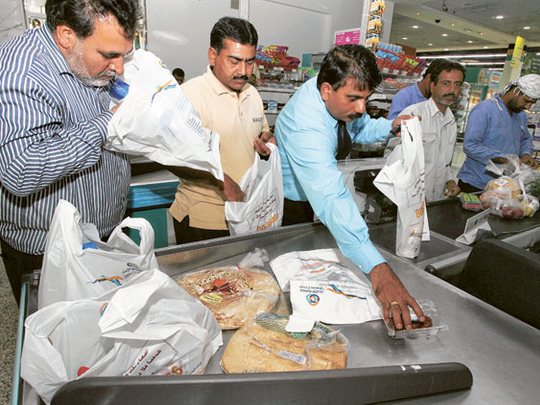
DUBAI: Shoppers using biodegradable plastic shopping bags may be mighty happy about their "green" properties, but they could be in for a big let-down as the new bags won't be as strong as conventional ones, said an official.
Engr. Mohammad Badri, Acting Director General of the Emirates Standards and Metrology Authority (Esma), said: "For shoppers it won't mean higher costs because it's no different from traditional plastic bags, but there's a radical change in the underlying chemistry of the bags. And they have to be careful because biodegradable can bear less load due to their nature," he said.
Paper alternative
Will it hasten the use of paper bags among shoppers? "It is quite possible, with paper bags being an alternative," he said.
A number of local manufacturers are already producing biodegradable plastic bags - known in the industry as polyolefin - for major retailers like Spinneys, Lulu and Carrefour.
In contrast, polyethylene plastic, which takes many years to degrade and has been in use for over 80 years across the world, faces a ban in the UAE from January 2013.
Under Federal technical regulation No. 5009, approved in November 2009, a pellet-sized ingredient must be added to the plastic bag mix during production to help accelerate degradation, said Badri.
Meanwhile, the official has warned manufacturers dashing to be the first to supply supermarkets and groceries with officially-approved biodegradable plastic bags before the 2013 deadline not to use any government logo on their products without prior approval - or risk legal action.
"If you ask me whether we have approved any manufacturers, the answer is ‘not yet'. The process takes time, because we need to evaluate the manufacturing process and take samples and send them to reference labs outside the country for tests before we can certify them," said Badri.
He said any unauthorised use of their logo would invite legal penalties, adding that the practice of some manufacturers to use the logos of additive suppliers would soon be phased out and replaced by Esma's stamp.
In theory, biodegradable plastic bags would dissolve - instead of calcifying like polyethylene does - when ingested by camels in the wild. "It's good to see many early adopters," said Bardi, "instead of waiting till December 31, 2012," to switch to the new UAE standards - taken from both the European and American versions.
As of January 10, Esma has approved three additive brands - D2W, Willowridge Plastics and Enerplastic.
The UAE consumes 20 billion bags out of the global figure of 500 billion, according to organisers of ArabPlast exhibition. Biodegradable plastics can be "programmed" to completely degrade in six months.
Badri said Esma's highly-qualified assessors will conduct twice-yearly audits of plastic bag makers to ensure compliance even before the 2013 deadline.












